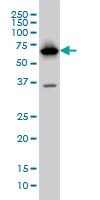ST1508 Sigma-AldrichAnti-PCK1 Mouse mAb (3E4)
This Anti-PCK1 Mouse mAb (3E4) is validated for use in ELISA, Immunoblotting, Immunocytochemistry for the detection of PCK1.
More>> This Anti-PCK1 Mouse mAb (3E4) is validated for use in ELISA, Immunoblotting, Immunocytochemistry for the detection of PCK1. Less<<Synonyms: Anti-Phosphenolpyruvate Carboxykinase 1
Recommended Products
Overview
| Replacement Information |
|---|
Key Spec Table
| Species Reactivity | Host | Antibody Type |
|---|---|---|
| H | M | Monoclonal Antibody |
Products
| Catalogue Number | Packaging | Qty/Pack | |
|---|---|---|---|
| ST1508-100UGCN | 100 μg |
| References |
|---|
| Product Information | |
|---|---|
| Form | Liquid |
| Formulation | In PBS, pH 7.2. |
| Negative control | 293T cells |
| Positive control | HepG2 cells |
| Preservative | None |
| Quality Level | MQ100 |
| Physicochemical Information |
|---|
| Dimensions |
|---|
| Materials Information |
|---|
| Toxicological Information |
|---|
| Safety Information according to GHS |
|---|
| Safety Information |
|---|
| Product Usage Statements |
|---|
| Packaging Information |
|---|
| Transport Information |
|---|
| Supplemental Information |
|---|
| Specifications |
|---|
| Global Trade Item Number | |
|---|---|
| Catalogue Number | GTIN |
| ST1508-100UGCN | 04055977224160 |
Documentation
Anti-PCK1 Mouse mAb (3E4) SDS
| Title |
|---|
Anti-PCK1 Mouse mAb (3E4) Certificates of Analysis
| Title | Lot Number |
|---|---|
| ST1508 |











